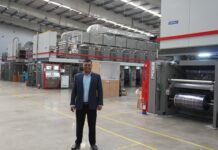Nagpur-based flexible packaging printer-converter Vaibhav Plasto Printing & Packaging has ordered a pair of Bobst Nova RS 5003 gravure printing presses. The company has been operating a Bobst RS 5002 gravure press for half a dozen years.
“Our first Bobst press was the 5002 installed in 2015. We were extremely happy with the way Bobst handled the post-sales services. Their team was always ready to troubleshoot and whenever there was any issue with the press, they were there to fix the problem. We had faced some minor issues with the 5002 we bought, but Bobst did not deny the problems – all the problems were accepted and worked upon which we appreciated. Hence, when we were deciding to get the new presses, we automatically went for the two Bobst Nova RS 5003 presses,” says Vaibhav Agrawal, director of Vaibhav Plasto Printing & Packaging.
The first of the two presses has landed in Nagpur and will arrive at the company’s shop floor by end-January 2022. The installation is expected to take two months. The second Bobst Nova RS 5003 will arrive after another three months and is expected to be installed in the middle of this year.
Vaibhav Plasto is among the fastest-growing companies in central India with a turnover of more than Rs 1,000 crore and more than 2,000 employees. In 2007, it diversified and started the printing and packaging division at the Hingna Industrial Area in Nagpur, and called it Vaibhav Plasto Printing & Packaging.
The group operates in two verticals. RC Plasto Tanks and Pipes, which is managed by directors Neelesh and Vishal Agrawal, while the flexible printing, packaging, and shrink sleeve labels business division is headed by Vaibhav Agarwal, the director of Vaibhav Plasto Printing & Packaging.
The Nova RS 5003 is a highly productive gravure press that delivers quality performance on a variety of flexible materials, including the new eco-friendly packaging substrates. The press is easy to operate with fast make-readies and changeovers. It features Bobst’s unique solutions for sustainable operation with minimum waste for water-based or solvent-based ink printing applications.
Big investment and expansion drive
The two Bobst gravure presses are not the only major investment Vaibhav Plasto is making. The company has an upcoming plant on a total land area of 92,000 square meters with plans to construct an industrial built-up space measuring 40,000 square meters. In the initial phase, approximately 28,000 square meters (or about 300,000 square feet) of the shed are being built.

“We are investing more than Rs 100 crore (approximately EUR 12 million) in the first phase of the expansion and have an overall commitment of investing Rs 455 crore (approximately EUR 55 million) with the Maharashtra government. These investments are a part of our endeavor to capitalize on the opportunity that the Indian packaging industry offers. We are becoming future-ready,” says Agrawal.
The two new Nova RS 5003 presses will be housed in the new shed with space remaining for another two such presses. Once the first shed is completed and populated with equipment, the company will have a capacity to produce 3,000 tons of flexible packaging material each month.
“Although the first phase will have a capacity of 3,000 tons per month, we will start with 1,000 tons of active capacity. Since we already have a capacity of 1,000 tons a month, once the first phase of the new investment drive is complete, we will have a capacity of 2,000 tons per month. The new shed should be ready by March. The company also plans to add a CPP line, a metallizer, and maybe a polyester line later – and if required, we may buy more land,” says Agarwal.
Vaibhav Plasto supplies flexible packaging material to customers across the country and several verticals.
Robust growth in Indian flexible packaging
Agarwal believes that the Indian flexible packaging industry will continue to grow and be driven by consumption growth. He says that some of the growth will be driven by brands replacing non-flexible packaging with flexible materials. “I see robust growth in the industry. Customers have been demanding quality and speed – and that trend will continue,” he concludes.











